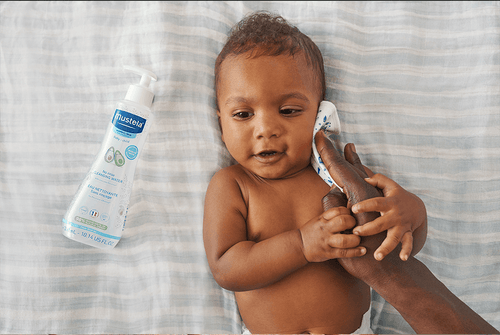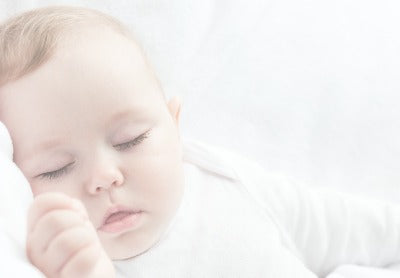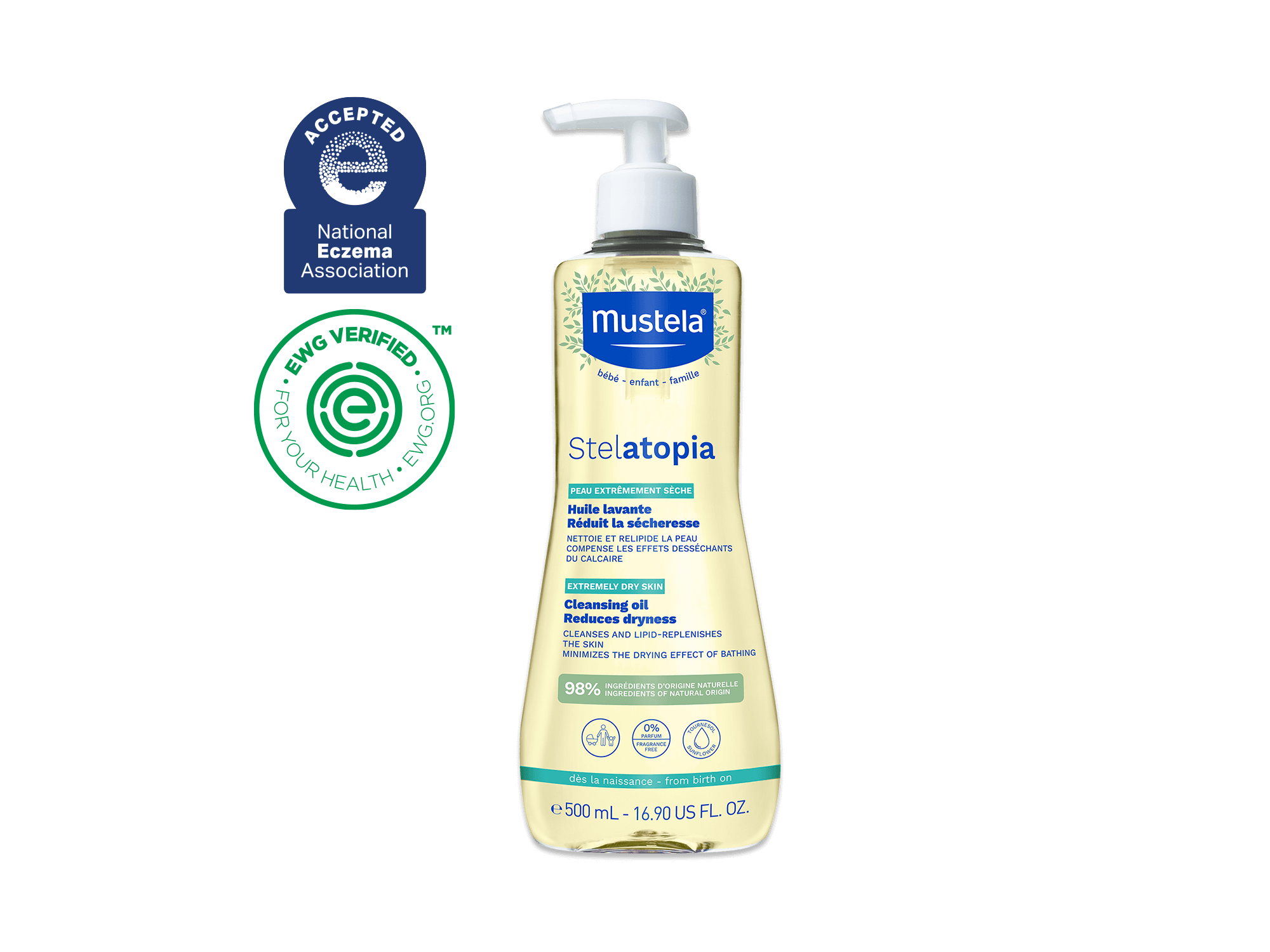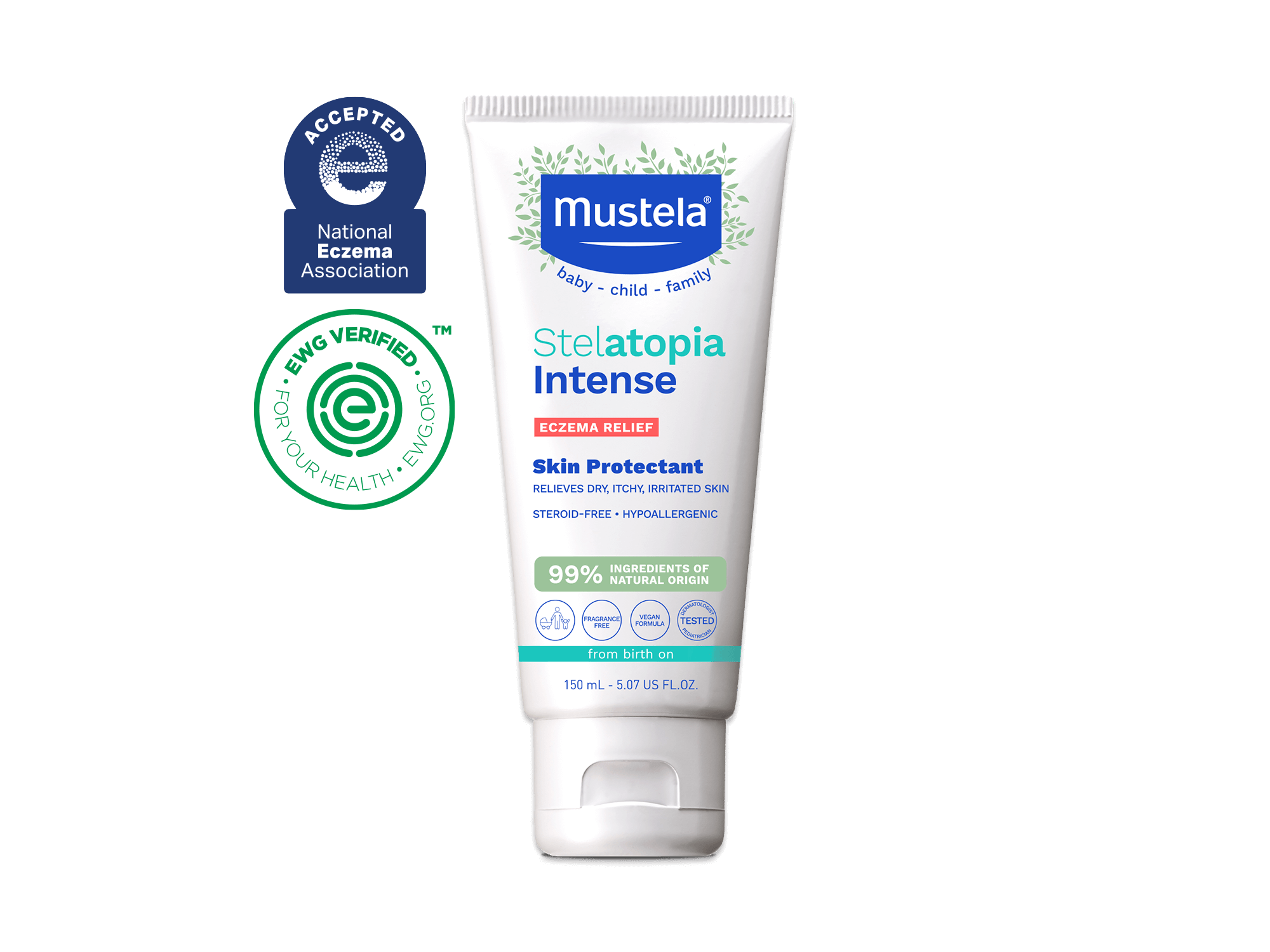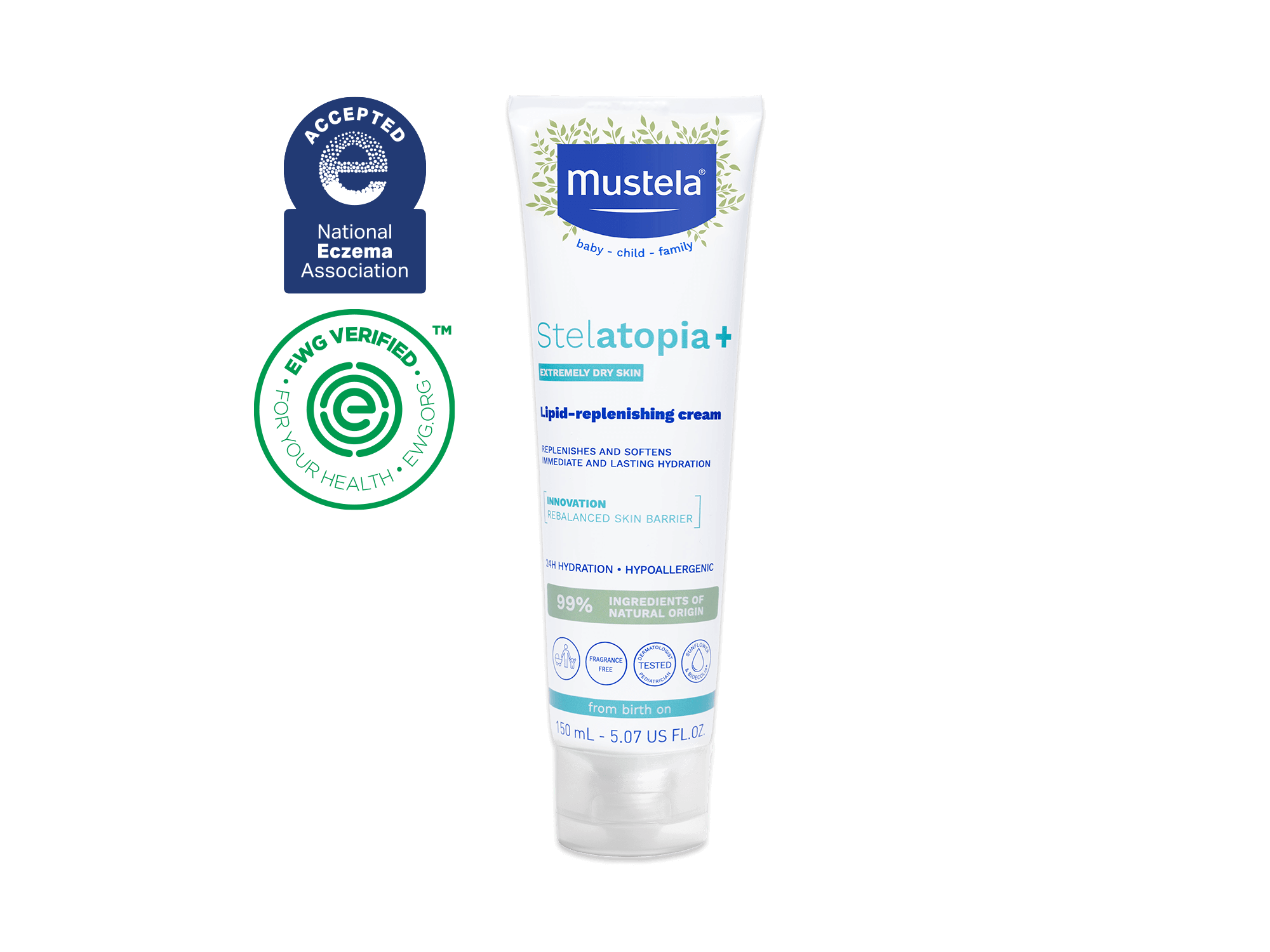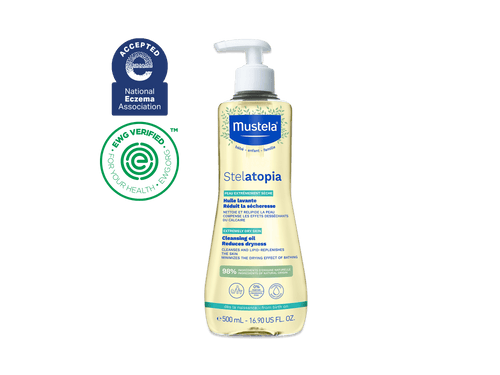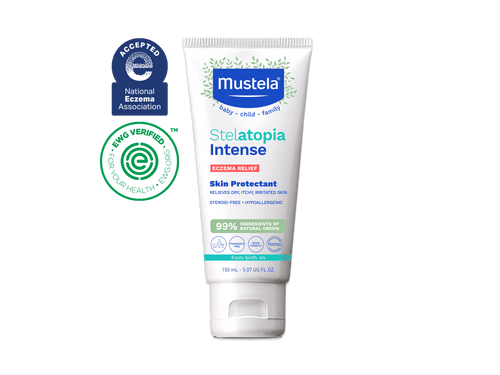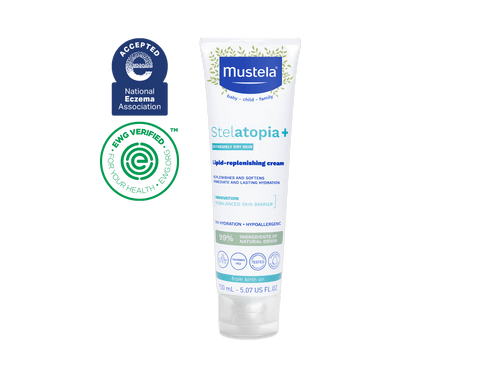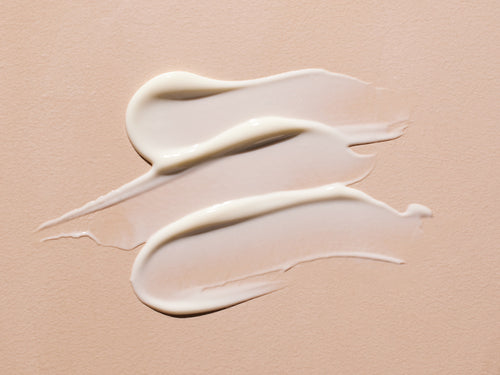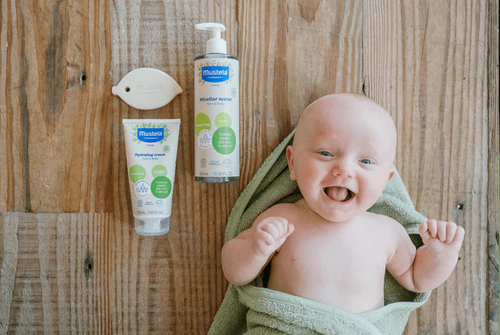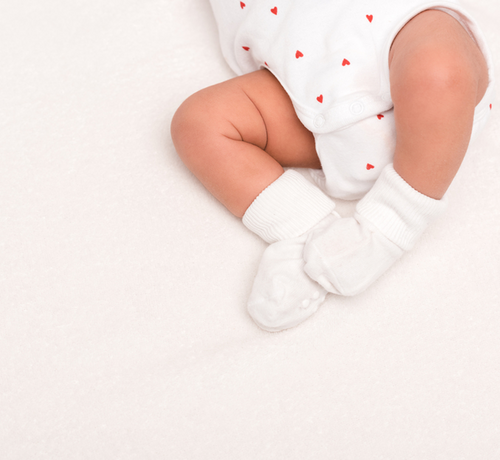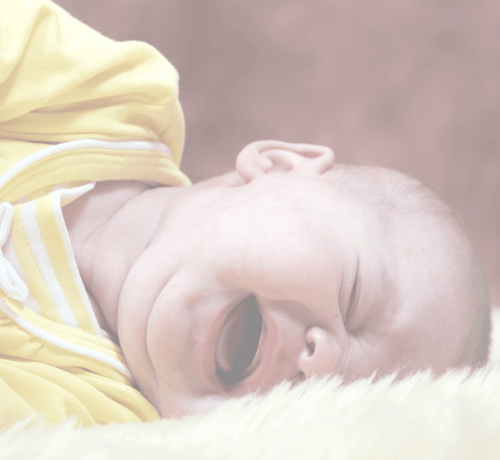The itchy, red swelling of eczema can cause your baby a lot of discomfort. So much so that it can even disrupt their sleep habits. We all know that those growing bundles of joy need a lot of rest, so even a small disruption can quickly turn into a large problem. What can a concerned parent do to make sure their baby rests easy? Mustela’s experts will give you some simple tips to help your baby fall asleep faster and stay there longer.
Apply An Emollient Product
Applying an emollient product, like Mustela’s Stelatopia Emollient Cream, Stelatopia Emollient Balm, or Stelatopia Emollient Face Cream is one of the best things you can do to help relieve the itching and irritation brought on by an eczema flare-up. In fact, this one simple act of love can reduce itching and swelling by up to 95%. That’s a lot of relief!
Don’t hesitate to cover your baby’s entire body in emollient cream before you put them down for a nap or a night’s sleep. If your baby should start getting restless in the middle of the night, you can even reapply the emollient balm to help soothe them back to sleep.
If a particularly stubborn flare-up refuses to go away after a week, be sure to consult your pediatrician. Chances are, they will prescribe a topical steroid like hydrocortisone to relieve the itching and reduce the swelling. Follow their directions for this medication, but continue to apply an emollient product to your baby’s skin at least once a day, if not more.
Lower The Temperature In Your Baby’s Room
Along with applying an emollient product, lowering the temperature in your house is one of the most effective treatments for an eczema flare-up that is keeping your baby awake. Sensitive skin conditions, like eczema, can be aggravated by high temperatures or low humidity. This hot, dry air can speed moisture evaporation on your baby’s skin, weaken the hydrolipidic barrier, and cause your baby’s skin to become irritated and itchy.
Mustela’s experts recommend that you keep your baby’s room (or the whole house) at around 64℉ with a moisture level (humidity) above 30% during the night. This temperature allows your baby’s body to cool down at night (making it easier to get to sleep), and won’t inflame their eczema. The elevated humidity means that more moisture will stay on your baby’s skin rather than evaporating. That can help reduce the irritation of a flare-up. If you don’t have a humidifier, try placing a pan of water on a heating vent, or hang a wet towel in their room. Both of these options will raise the humidity.
Cuddle With Your Baby

Cuddling with your baby is a great way to get your baby to calm down enough to go to sleep. It may not directly mitigate the uncomfortable symptoms of eczema, but it will help them relax. Babies like to be held snug and close to your body. When they are there, they feel safe and secure. That means they’ll relax better than they would if they were left alone in a crib or bassinet.
If your baby is having a hard time sleeping because of an eczema flare-up, take the time to hold them close and rock them in your arms. You can do this while you’re standing by gently bouncing up and down or swaying back and forth. You can also cuddle with your baby while you’re sitting by rocking in a rocking chair. Babies love this type of easy movement and it’s one of the surest ways to help your baby fall asleep in no time.
Give Your Baby A Gentle Massage

Think, for a moment, about how you feel after getting a massage. Do you feel calm and relaxed or tense and uptight? We’re guessing it’s the former, right? Your baby is no different. A gentle massage can distract them from their dry, itchy skin while helping them to relax and preparing them to fall asleep.
Start your baby’s massage by massaging their feet and ankles. Make the strokes gentle but firm and try your best not to tickle them. Remember, babies are extra squishy so you don’t need a lot of force like you would with an adult. Spend thirty seconds to a minute (or even more) on each major muscle group before moving on to the next.
After a few moments at the feet and ankles, slowly move your way up their legs massaging, first, their calves, and then the front and back of their thighs. Next, skip to their hands and wrists and then proceed up their arms to their shoulders. The massage doesn’t have to take a long time—it can be as brief as five to ten minutes. But if your baby needs something more involved, take the time to give it to them. They’ll sleep better for it...and so will you.
Apply Extra Emollient To Eczema-Prone Areas
Eczema can flare up on any part of the body, but, depending on your baby’s age, there are certain spots that will be more prone to the red, itchy patches. As we’ve already described above, you should apply an emollient product all over your baby’s body. However, for true relief, and to help your baby get to sleep and stay there longer, apply extra emollient to eczema-prone areas. Here’s a general breakdown of where the red patches are more likely to appear based on your baby’s age so you can know what to expect:
- Birth to twelve months: Plumper areas, like cheeks, forehead, arms, and belly, will show signs of eczema first.
- Twelve months to three years: Between one and three, your baby’s skin folds—elbows, back of the keens, even behind the ears—will be more prone to eczema flare-ups.
- Three years to six years: At this age, eczema likes to settle on the hands and face, particularly around the mouth and on the eyelids.
Expert tip: To help further relieve eczema-prone skin and prevent future flare-ups, dress your baby in Mustela's Stelatopia Skin Soothing Pajamas after using our Stelatopia bath and moisturizing products. Made with natural ingredients, these pajamas deliver skin-soothing moisture all night long so your baby can rest well.
The extra attention you give to these areas, and the healing effects of a cream like Mustela’s Stelatria, will help your baby’s skin repair itself. The emollient cream or balm will even restore the skin’s natural ability to produce its own protective layer. And that means fewer flare-ups and deeper, more restful sleep for you and your baby. Keep in mind that eczema is a genetic condition, so it can never be completely cured. The symptoms—the red, swollen, itchy spots—may disappear and not come back for years, yet the potential for an outbreak is still there. That’s why older children, teens, and even adults continue to use products in Mustela's Stelatopia line to help keep eczema at bay.

